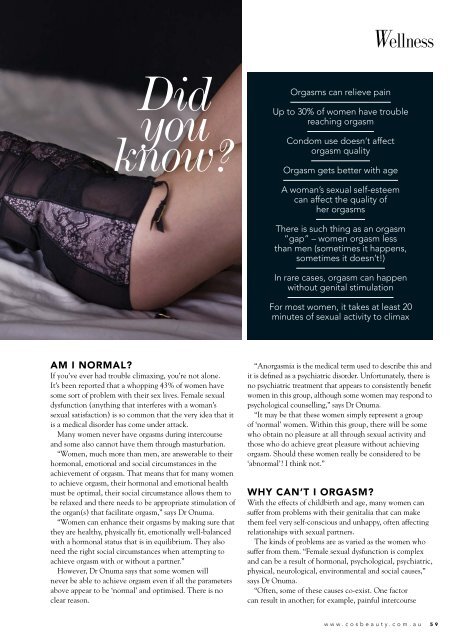CosBeauty Magazine #76
The go to beauty, health and lifestyle magazine for Australians who want to look and feel their best.
The go to beauty, health and lifestyle magazine for Australians who want to look and feel their best.
Create successful ePaper yourself
Turn your PDF publications into a flip-book with our unique Google optimized e-Paper software.
Wellness<br />
Did<br />
you<br />
know?<br />
Orgasms can relieve pain<br />
Up to 30% of women have trouble<br />
reaching orgasm<br />
Condom use doesn’t affect<br />
orgasm quality<br />
Orgasm gets better with age<br />
A woman’s sexual self-esteem<br />
can affect the quality of<br />
her orgasms<br />
There is such thing as an orgasm<br />
“gap” – women orgasm less<br />
than men (sometimes it happens,<br />
sometimes it doesn’t!)<br />
In rare cases, orgasm can happen<br />
without genital stimulation<br />
For most women, it takes at least 20<br />
minutes of sexual activity to climax<br />
Am I normal?<br />
If you’ve ever had trouble climaxing, you’re not alone.<br />
It’s been reported that a whopping 43% of women have<br />
some sort of problem with their sex lives. Female sexual<br />
dysfunction (anything that interferes with a woman’s<br />
sexual satisfaction) is so common that the very idea that it<br />
is a medical disorder has come under attack.<br />
Many women never have orgasms during intercourse<br />
and some also cannot have them through masturbation.<br />
“Women, much more than men, are answerable to their<br />
hormonal, emotional and social circumstances in the<br />
achievement of orgasm. That means that for many women<br />
to achieve orgasm, their hormonal and emotional health<br />
must be optimal, their social circumstance allows them to<br />
be relaxed and there needs to be appropriate stimulation of<br />
the organ(s) that facilitate orgasm,” says Dr Onuma.<br />
“Women can enhance their orgasms by making sure that<br />
they are healthy, physically fit, emotionally well-balanced<br />
with a hormonal status that is in equilibrium. They also<br />
need the right social circumstances when attempting to<br />
achieve orgasm with or without a partner.”<br />
However, Dr Onuma says that some women will<br />
never be able to achieve orgasm even if all the parameters<br />
above appear to be ‘normal’ and optimised. There is no<br />
clear reason.<br />
“Anorgasmia is the medical term used to describe this and<br />
it is defined as a psychiatric disorder. Unfortunately, there is<br />
no psychiatric treatment that appears to consistently benefit<br />
women in this group, although some women may respond to<br />
psychological counselling,” says Dr Onuma.<br />
“It may be that these women simply represent a group<br />
of ‘normal’ women. Within this group, there will be some<br />
who obtain no pleasure at all through sexual activity and<br />
those who do achieve great pleasure without achieving<br />
orgasm. Should these women really be considered to be<br />
‘abnormal’? I think not.”<br />
Why can’t I orgasm?<br />
With the effects of childbirth and age, many women can<br />
suffer from problems with their genitalia that can make<br />
them feel very self-conscious and unhappy, often affecting<br />
relationships with sexual partners.<br />
The kinds of problems are as varied as the women who<br />
suffer from them. “Female sexual dysfunction is complex<br />
and can be a result of hormonal, psychological, psychiatric,<br />
physical, neurological, environmental and social causes,”<br />
says Dr Onuma.<br />
“Often, some of these causes co-exist. One factor<br />
can result in another; for example, painful intercourse<br />
www.cosbeauty.com.au 59

















